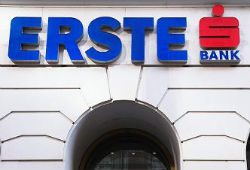Erste Bank: Debt crisis weighing down on euro zone more than on US |
Autor: Bancherul.ro
2012-10-17 16:19 |
|
 "Restoring government budgets will continue to occupy capital markets. Nonetheless, volatility has decreased significantly," said Fritz Mostböck, Head of Research at Erste Group, according to a bank statement.
"Restoring government budgets will continue to occupy capital markets. Nonetheless, volatility has decreased significantly," said Fritz Mostböck, Head of Research at Erste Group, according to a bank statement.
"As a consequence of the very subdued to shaky development of the economy, it is still recommendable to take a selective approach to investing. Overall, there are opportunities in stock markets in the fourth quarter and in other asset classes such as gold and high-yield corporate bonds."
Euro zone
A number of measures have already been taken to fight the sovereign debt crisis in the euro zone, but the situation has yet to be solved. The European Central Bank is pursuing the mission to maintain a "strong and stable" currency and is attempting to reach all member states also with exceptional measures. Even though an expansive monetary policy can counteract downside risks, it cannot solve the problems facing the euro zone now. What is needed is a sustainable path to growth and to the debt problem. To achieve sustainable growth and employment without excessive imbalances, structural reforms need to be carried out and competiveness strengthened. This will take time and the stability of the euro will ultimately depend on reaching a common decision that also has democratic legitimization.
Economy
The development of the economy in the euro zone will remain moderate due to the consolidation efforts of the governments and dampened sentiment. Internal demand is weak and stimulus from foreign demand seems doubtful as a consequence of slowing global growth. The rate of growth in China is slowing more and more, and therefore, it will be important for the US to play a supportive role as the worldwide largest end consumer component. In the euro zone, it will be all the more important to help the over-indebted and less competitive countries to find their way back to the growth path, but the necessary structural reforms will take some time. "The insecurity prevailing over the further development of the economy remains high, the latest sentiment and leading indicators are disappointing, and the economy is expected to bottom out near the end of the year," said Gudrun Egger, Head of Major Markets & Credit Research. The analysts of Erste Group expect slightly negative GDP growth of -0.3% for 2012, and in the coming year, a moderate recovery of 0.5% is expected.
Bonds
The inflation forecast of the ECB for the next two years is close to 2%, with the oil price being the most important upside risk apart from the temporary effects of value added tax hikes. Should there be any further price hikes, this would push up inflation and reduce the room for manoeuvring of the ECB. Over the medium term, the analysts of Erste Group expect downside pressure on inflation considering the sluggish development and high unemployment rates in the peripheral euro zone states. "We expect low interest rates to last for some time, at least until 2015. This will keep Bund yields low in conjunction with the sustained safe haven flows," explained Egger. Yields on US government bonds will also stay low, because the Fed has already announced that it will keep interest low until at least 2015. In this highly uncertain setting, investors continue to show a preference for safe investments and thus yields on investment grade corporate bonds will tend to move sideways. The confidence of investors in corporate bonds continues to rest on the solid fundamental situation of European firms. When investors seek to earn returns in phases of higher risk appetite, high-yield corporate bonds should profit.
Currencies
As the euro zone still has quite a number of problems to solve with respect to the sovereign debt crisis, the euro will remain under pressure. The expansive central bank policy could also weaken the euro. Therefore, the analysts of Erste Group expect the euro to move closer to the fair value of USD 1.2 in the course of the year. Also the Swiss National Bank is expected to stick to its floor in the coming months in such an environment. One of the tasks of this floor might entail the strong and swift appreciation of the franc and fuel deflationary risks. The exchange rate vs. the euro will therefore stay at around 1.20, which is the Erste Group analysts' estimate of the fair value. Gold is profiting from the negative real interest and the usually positive seasonal effects at year end. "We expect to see the price climb by 5% to 10% in the fourth quarter," said Hans Engel, Strategist for International Equities at Erste Group.
Equities
Currently, negative earnings revisions outweigh on most markets, but this trend is already improving. Global stocks are profiting especially from the measures announced by the ECB and the Fed. The global Economic Surprise Index also trended upwards, and thus volatility on the markets will probably remain low. This is good news for the stock market. A moderate rise of the MSCI World is expected for the fourth quarter of up to +5%. The research team of Erste Group recommends stocks from the technology, consumer and healthcare sectors due to their good return-risk profiles. Not least, because this is where the highest potential for earnings growth lies. The valuation of stocks at a P/E ratio of 14x is worldwide within the range of the long-term average. "The dividend yield of 3% is attractive in comparison to investment grade government bonds. This also underpins our positive outlook for global stocks in the fourth quarter 2012," said Hans Engel. Attractive markets are currently Western Europe, CEE and Russia as well as Brazil and India.
|
|

